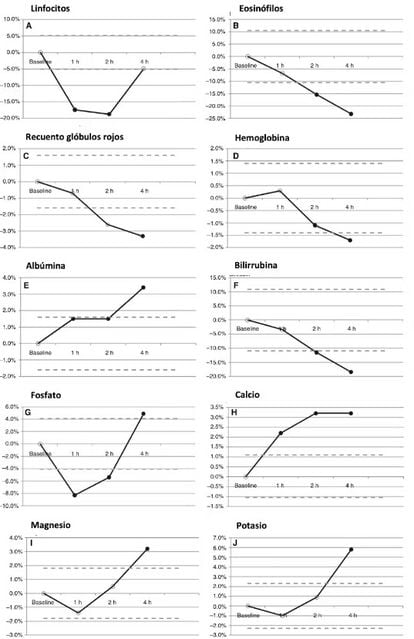He leaves the doctor with a flyer for an analysis, goes to the counter and is given an appointment for 8 in the morning, warning him that he must come on an empty stomach. She shows up on the day of the appointment with an empty stomach and very drowsy (from not drinking, she hasn’t even had coffee). And he finds himself with a kilometer-long queue of people with their respective steering wheels in their hands. After half an hour of waiting, you don’t even know what it’s called: all you want is to get out of there and have breakfast once and for all.
But is all this really necessary? Fasting tests were the norm a while ago, when glucose, lipids and blood cell counts were always measured, but little else. Of course, if you ate a piece of cake right before the puncture, your glucose shot up. However, in recent times the analyzes have diversified, and the information extracted from a blood sample does not always depend on what we have eaten in the previous hours.
Measure glucose and cholesterol without fasting?
That the types of blood tests have increased in recent times is good news, as it means that doctors can extract more information from a sample. This can save us from other more invasive tests (such as biopsies) or more cumbersome and expensive tests (such as endoscopies or magnetic resonance imaging). The downside is that it creates confusion regarding the need to fast.
If we analyze the different types of blood tests one by one, we find that the majority follow requiring fastingalthough with the advancement of diagnostic techniques little by little new markers are being discovered that are not altered by food intake.
One of them is Hemoglobin A1c (HbA1c), which serves as an indicator of the blood glucose level during the last three months. In 2001, the WHO concluded that HbA1c could be used to diagnose type II diabetes. But how does it work? It turns out that the glucose circulating in the blood binds to the hemoglobin of red blood cells, generating, precisely, HbA1c. Since red blood cells have a half-life of 2 to 3 months, high levels of this type of hemoglobin indicate that the person has had high blood glucose levels for a long time. And that is much more significant than a specific measurement.
Regarding cholesterol, a New method to calculate the amount of LDL (bad cholesterol) that does not depend so much on what one has ingested in the previous hours.
In other cases, the information offered by prestigious hospitals and universities is contradictory. For example, in the case of kidney, liver, and thyroid function tests, some sources they bet on fastingwhile others equally serious affirm that this there’s no need.
Many medical providers favor eliminating fasting
In the United States, the Department of Veterans Affairs regulates, among other things, the medical services of all war veterans. And recently he decided do without fasting in most blood tests. The reasons given have to do with advances in diagnostic techniques and the possible hypoglycemia that can be caused to people with diabetes, in addition to the saturation of blood collection units in the morning. Fasting will only be required for some types of tests.
Other healthcare providers are also leaning into this trend. For example, the Australian chain of clinical analysis laboratories Clinical Labs advocate for ruling out fasting in all lipid analyses.
But what do the doctors think?
We have seen that the interests of patients and those of medical providers are aligned in favor of eliminating fasting for testing. But, at the end of the day, the person who requests the analysis and must interpret it and translate it into a concrete action – such as a treatment or intervention – is the specialist doctor. Therefore, it is essential to know his opinion on these new trends.
Unfortunately, there is scientific evidence that leads health professionals to be cautious and continue to recommend fasting in many cases. This evidence consists, first of all, in the fact that many of the markers obtained in blood tests suffer important variations within 4 hours of eating a light breakfast.
This is what is known as “laboratory bias” and especially affects measurements such as total blood cell count, albumin, bilirubin, phosphate, calcium, magnesium, potassium, etc.

It makes sense that food greatly affects blood tests. After all, consuming foods and drinks other than water causes our body to release hormones and metabolites that alter certain substances in our blood, which changes its composition.
Analysis, better in the morning?
Another concern, if the time at which one can go for an analysis is not regulated, is the variations throughout the day of the parameters to be measured. According to a meticulous study carried out with 24 healthy men, drawing blood every 3 hours during a complete 24-hour cycle, significant oscillations were observed in several parameters that are usually requested in a blood test.
Thus, it was observed that potassium, sodium, creatine kinase, bilirubin, lactate dehydrogenase, uric acid and others fluctuate significantly throughout the 24-hour interval. Only a few, such as magnesium or creatinine, do not vary significantly. Given the above, factors such as not knowing how long the person has eaten food, or even not always drawing blood at the same time of day, can lead to errors when diagnosing and prescribing medications.
Therefore, for now there are serious reasons to continue coming on an empty stomach – although well hydrated– to most analyses, and always perform them at the same time interval. Who knows if, in the not-so-distant future, we will be able to do without fasting and, with luck, even going to the hospital to undergo the most common diagnostic tests.
Matilde Canelles López She is a researcher and biologist from Moscow State University.
This article was originally published in The Conversation.
You can follow EL PAÍS Health and Wellbeing in Facebook, x and instagram.
#fasting #blood #test
